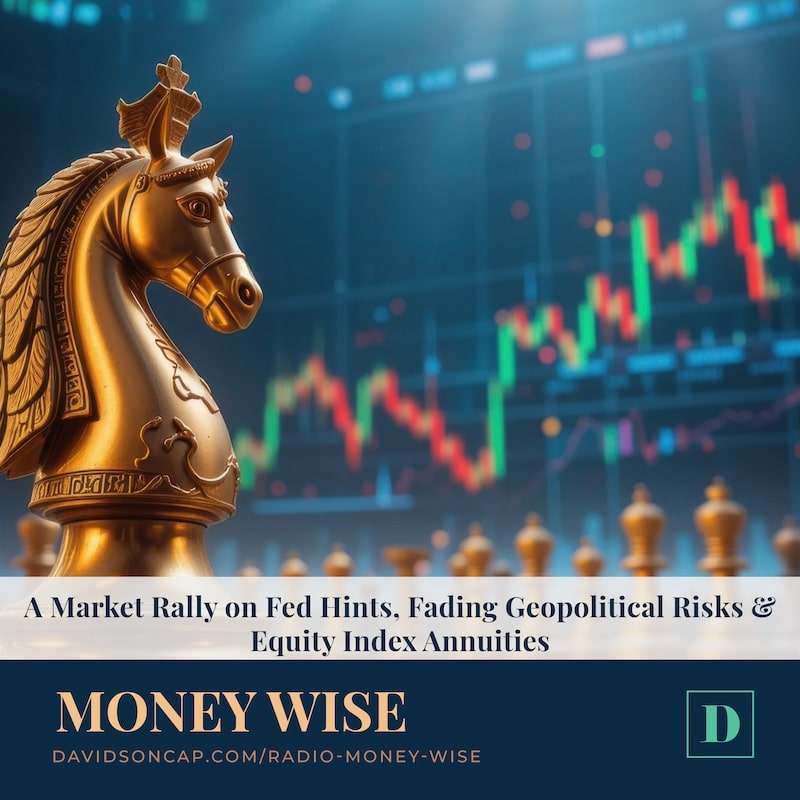Don’t Take Investment Advice from Someone Trying to Make a Quick Buck at Your Expense
If you have ever listened to our Money Wise Radio Show or podcast, you know that we strongly believe in investor education. And while there are dozens of worthwhile topics to cover, one that we come back to time and time again is laying out the differences between working with a Registered Investment Advisor (RIA) vs. a broker.
Why revisit this topic so often? Well, it is absolutely critical to understand the standards your investment professional is held to – and to understand that many are not required to act in your best interest.
When you’re nearing retirement and you want to ensure you’ll have an income stream from your investments, you’ll need to be intentional about what type of financial services professional you choose to work with. Now, at Davidson Capital Management, we think there’s only one right answer – a Registered Investment Advisor – and we’ll get into the details below. The decision isn’t as clear to most individual investors though, and that’s due to one thing: marketing.
Broker vs. Investment Advisor: What’s the Difference?
Marketing Tricks
As an investor, you are being served high-visibility advertising that positions many financial professionals as full-service investment advisors. They may use terms like stockbroker, account executive, wealth manager, financial advisor, or registered representative, just to name a few. What you need to know is that these professionals are on the financial sales side of the industry – they earn commissions, or management fees, or a combination of both for selling investment products to individual investors. RIAs, on the other hand, are on the asset management side of the industry. But with that said, it’s important to know that not all RIAs manage client assets in-house. Over the last decade, more and more RIAs have come into the financial services industry. Many of these RIAs come from the financial sales side of the industry because they realized investors were becoming savvier in understanding the fiduciary standard. These former financial salespeople turned RIAs don’t have the investment management experience needed to truly add value to their client’s portfolios. This forces a lot of newly minted RIAs to outsource their clients’ asset management to other experienced RIA firms. Investors who work with RIAs who follow this business structure, unfortunately, pay multiple asset management fees while not having a direct relationship with the RIA firm who is actively managing their assets.
Suitability Standard Versus Trust Standard
What so many investors don’t realize is that only RIAs are held to a fiduciary standard called the Trust Standard. It means that they are required by law to act in a client’s best interest and put those client interests above their own at all times. Stockbrokers and anyone else on the financial sales side of the industry are not fiduciaries. They are only held to the Suitability Standard, which means they are not required by law to protect a client’s best interests. You’ll see how important this distinction is in the following example.
SEE ALSO: Do You Know Your Investor Personality Type?
A Real-World Example: Why the ‘Suitability Standard’ Isn’t Really Suitable at All
Years ago, I met with a prospective client who had already retired. He had purchased a sizeable annuity and it was getting ready to be outside its surrender penalty period and he was looking to do something else with it. Our team provided our customary portfolio review and analysis and gave this prospective client a full presentation. I ended by telling him to never buy another annuity, no matter what. He left the office and I didn’t hear back from him.
It was 16 months later when he finally called again. He came into my office and said, “I should have listened to your advice.” He had purchased another variable annuity – and he was regretting it. I asked him why he did it, and he told me that five different stockbrokers at five different firms – and in three different states – all told him it was his best option for a lifetime income stream. He couldn’t understand how all these different investment professionals had all come to the same conclusion if it wasn’t truly his best option.
Well, his jaw hit the floor when I told him, simply, that they each recommended an annuity because it pays the highest commission on Wall Street – in this instance it would be a six-figure commission. Stockbrokers get away with this because an annuity is a “suitable” product for an investor like this gentleman. But was it truly the right product for him? No, it wasn’t.
Does the Government Offer Any Investor Protection?
The Dodd-Frank Act of 2010 created a law that gives the Securities and Exchange Commission (SEC) the ability to create a uniform fiduciary standard. Unfortunately, that has yet to take place across the financial services industry. Over the past year, though, the SEC has been in the news media saying that they are engaged in serious research and analysis with regard to the fiduciary standard. In particular, they may be poised to tighten the standards applying to anyone who recommends stocks, bonds, or mutual funds to individual investors.
In a separate regulatory effort, the Labor Department has been working on its own new set of standards for financial professionals who advise individuals on retirement accounts, such as 401(k)s.
How to Protect Yourself (And Your Retirement Nest Egg)
There are unscrupulous actors in every industry, and certainly in financial services. When it comes to planning your investments, especially those designed to sustain you in retirement, it’s important to take your time interviewing prospective investment professionals. Give yourself at least 6-8 months – 12 if you’re able – to select the best one for you. Never lose sight of the fact that the only professionals who are legally required to act in your best interest are those who are fiduciaries. So, choose a fiduciary RIA, like we are here at Davidson Capital Management, so you can have peace of mind that you aren’t being taken for a ride. Do your due diligence and don’t fall for marketing gimmicks. If something sounds too good to be true, it is!
Here’s an easy strategy: If you’re interviewing an investment professional and you can’t tell if they are required to follow the Suitability Standard or the Trust Standard, ask this question: Do you hold a Series 7 Securities License?
If the answer is yes, there is a very good chance this person is NOT a fiduciary held to the Trust Standard. (And that should be the last question you ask before you waste any more of your time with that person!)
Whether you’re actively looking to hire an investment professional or currently working with one it’s important for all investors to examine an investment professional’s “permit record” or U4. The U4 is a report that tracks an investment professional’s work history, securities licenses, discloses client complaints, or criminal/civil legal proceedings against the investment advisor. An investment professional’s U4 report can be found at www.brokercheck.finra.org.
SEE ALSO: How to Choose the Best Investment Advisor for You
Don’t Get Caught Behind the Eight Ball
Before you ride off into the retirement sunset, spend time interviewing any investment professionals you may want to work with. Ask them the hard questions, determine whether they are fiduciaries, and select a professional who truly understands your goals and is required to act in your best interest. Get your ducks in a row before you retire, so you won’t find yourself scrambling at the last minute and accidentally making a decision you may regret.
At Davidson Capital Management, we want you to protect yourself and the nest egg you’ve worked so hard to build. We don’t want you to get taken by someone trying to make a quick buck at your expense. We’ve actively managed client assets in-house since 1989, as fiduciaries, and we’re here to help you achieve your investment goals. Contact us today for a portfolio review and analysis or to learn more about what it means to work with a Registered Investment Advisor.




